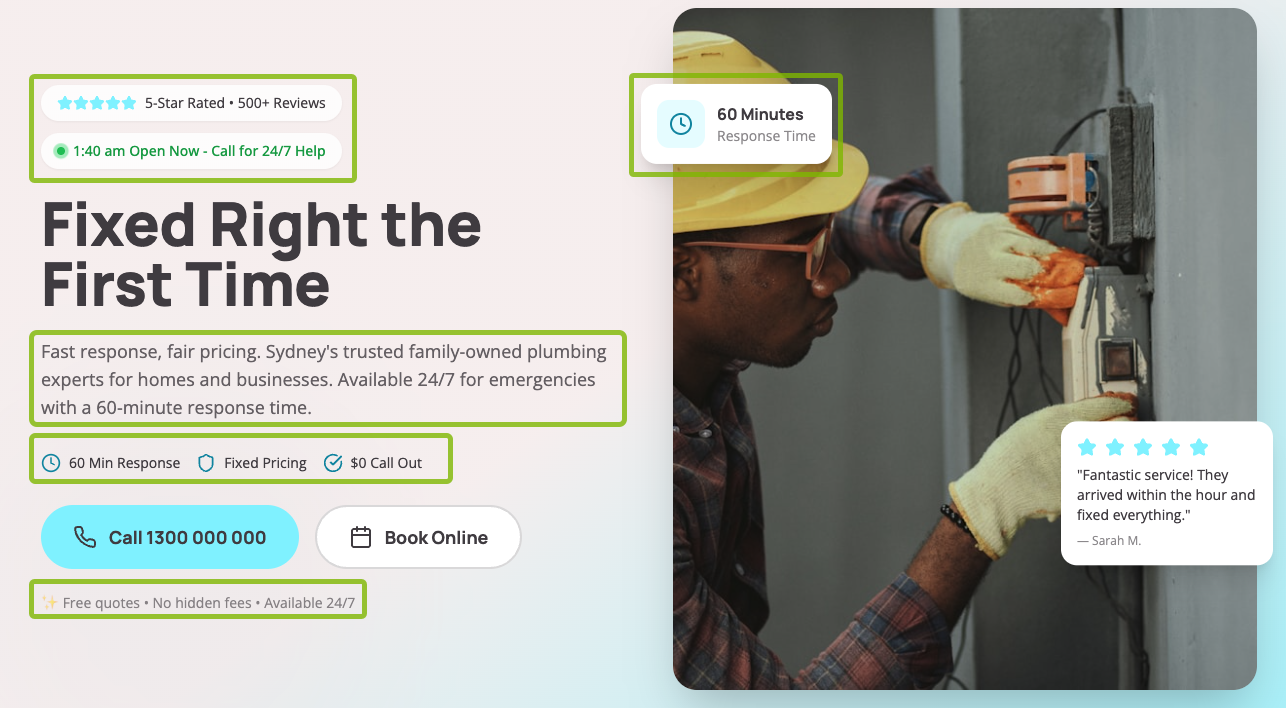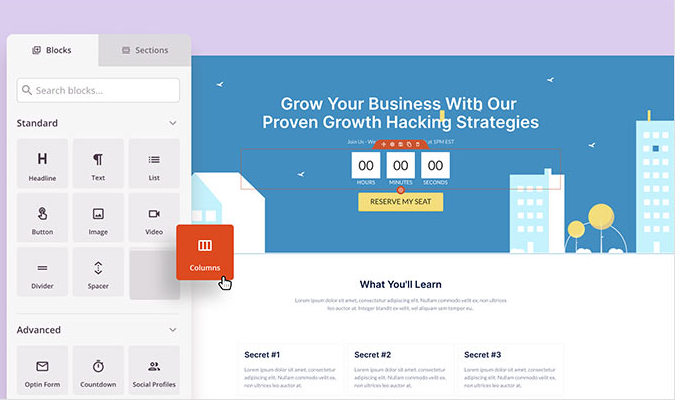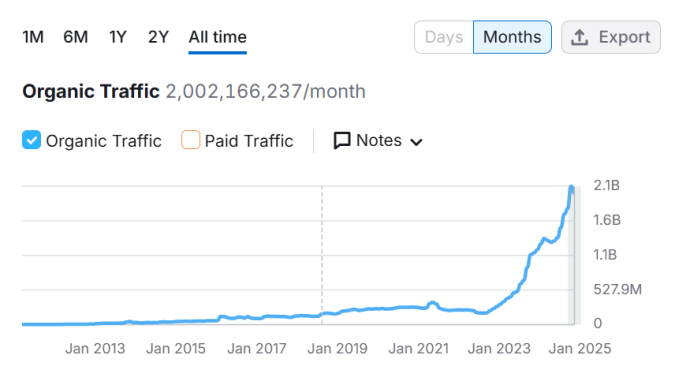It makes sense to choose cheap web hosting if you’re starting a brand new website from scratch or you’re not planning to get a ton of traffic. You won’t get the best performance, but you really won’t need it if your site isn’t getting a lot of visitors. All you really need is a cheap hosting provider that’s easy to use with strong customer service and enough scalability for the near future.
The Top 7 Cheap Web Hosting Providers in 2026
We’ve used dozens of cheap web hosting providers at one point or another. We’ve also thoroughly tested just about every shared hosting plan out there. Based on our experience, there are hosts that fit the needs of most new websites.
If you want cheap hosting that balances ease of use, service, and scalability, go with Hostinger. It’s the most beginner-friendly provider and the lowest-priced long-term plan comes with everything you need to get started.
Bluehost offers a solid WordPress drag-and-drop website builder if you don’t want to worry about picking from thousands of themes on your own. It also has an AI site builder (WonderSuite) that’ll do much of the heavy lifting for you.
If you want to build an ecommerce store without a high price tag, HostGator offers affordable WooCommerce-friendly hosting with specialized features for online stores.
However, these three aren’t the only options. GreenGeeks, Hosting.com, DreamHost, and SiteGround are also great choices.
Let’s dive into more details about each one to help you decide.
#1 – Hostinger — Best Balance of Ease of Use, Customer Support, and Short-Term Scalability

Hostinger is the perfect blend of quality hosting at an affordable price—making it our favorite cheap web hosting provider.
Other hosts try to keep costs low by providing minimal storage space on entry level plans.
Hostinger takes a different approach. Its Premium Web Hosting plan—the one most people choose—still stays under a few dollars a month on a long term, gives you support for up to three websites, 20 GB of fast NVMe/SSD storage, unmetered traffic, a free domain for a year on eligible terms, automatic WordPress updates, and a website builder.
If you need more room, Hostinger’s Business and Cloud plans jump storage up to 50 GB, 100 GB, or more and raise the website limit (up to 100 sites on cloud) while keeping pricing reasonable. That means you no longer have to assume you’re stuck with just 10–20 GB or a single site on the “cheap” plan.
This is perfect if your site has large images, videos, gifs, and other types of files that take up a lot of space.
It’s even more beneficial if you’re hosting more than one website—many Hostinger plans allow multiple sites on the same account, so you don’t have to buy a new package every time you want to launch something new.
Longer terms typically unlock the best introductory pricing.
Even on the cheapest eligible tier, you get a free SSL certificate, unmetered traffic, a free domain for the first year when you choose an annual term or longer, free migrations if you’re moving from another host, and automatic WordPress updates for hands-off management. Single Web Hosting doesn’t include the domain, so pick Premium or higher if you want that perk.
Alternatively, you can use Hostinger’s drag-and-drop or AI website builder.
Either way, Hostinger offers a beginner-friendly onboarding process so you don’t have to build your site alone. It walks you through every single step—it doesn’t get much easier.

You can also rest assured that your site is protected thanks to built-in DDoS protection, a web firewall, and malware scanning. Furthermore, all Hostinger domains come with free WHOIS Protection, so that’s one less cost to worry about.
Even though it’s cheap, it doesn’t feel cheap. In fact, it comes with all the same features as every other host… and then some.
If you need even more resources or want a CDN, extra WordPress tools, ecommerce features for the drag-and-drop builder, and on-demand backups, higher-tier plans bump you up to faster storage with better performance.
The Business plan also comes with improved performance, enhanced DDoS protection, and AI tools built specifically for WordPress.
For a modest increase in monthly cost, you get a ton of functionality and space for all your files, even if you’re hosting dozens of sites on the same plan.
No matter the plan you choose, Hostinger’s customer service agents are responsive, knowledgeable, and friendly—and live chat typically replies within minutes now, which is better than it used to be.
Aside from shared hosting, Hostinger offers cloud and VPS plans so there’s plenty of room to grow without having to worry about switching to a different provider any time soon.
Sign up now to lock in Hostinger’s best long-term rate.
#2 – Bluehost — Best WordPress Website Builder

Like Hostinger, Bluehost offers any-time 24/7 support via multiple channels, comes with everything you need, and gives you plenty of room to grow without having to switch to another provider. It’s still one of only three hosting providers officially recommended by WordPress.
Bluehost’s current shared/WordPress lineup now lets you host up to 10 websites on the entry plan, with 10 GB of NVMe storage, a free CDN, a free SSL certificate, WordPress preinstalled, and a free domain for the first year on 12 months or longer. That’s a better deal than older “1 site only” versions of the plan.
WordPress is flexible, straightforward, and highly customizable, too. It’s not the easiest website platform out there, but Bluehost makes using it as simple as it gets. The platform comes pre-installed for you and there are dozens of free tutorials that teach you everything you need to know.
Even if you’ve never built a website before, Bluehost’s mistake-proof onboarding process walks you through every step.
While every other provider on this list also works well with WordPress, Bluehost delivers a wide array of WordPress-centric features and hosting plans for WooCommerce users, too.
Aside from themes, Bluehost WonderSuite makes customizing and updating your website easier than ever. You’ll be able to drag-and-drop your way to a professional, custom website that matches your brand—even if you’ve never built a website before.

Overall, the introductory plan is a great place to start, especially if you’re hosting your first website.
Bluehost’s Choice Plus (and higher) plans still bump storage, add extra security tools, daily or weekly backups, and higher resource limits—worth it if you’re planning to host a handful of sites.
No matter the plan you choose, Bluehost delivers a beginner-friendly platform that guides you through creating your first website. You’ll get a step-by-step walkthrough of what to do to get your site set up from start to finish, with the option to skip the guided setup process if you know what you’re doing.
You’ll also get automatic WordPress installation and core updates, so your site is always running the most up-to-date software without you having to do a thing.
The most significant downside of Bluehost is the number of upsells in the checkout process. A couple are pre-selected for you, even though you don’t really need them: CodeGuard Basic and SiteLock Security.
You can safely uncheck these and get similar features for free elsewhere.
Aside from that, you’ll get less storage than you would with Hostinger on a comparable plan, and several Bluehost perks (like domain privacy) are time-limited promos that increase in cost at renewal.
Get started with Bluehost today.
#3 – HostGator — The Best (Cheap) WooCommerce Hosting

If you’ve never built an ecommerce store before, it can feel daunting and confusing. HostGator’s ecommerce-friendly WordPress plans come with WooCommerce-ready WordPress, security, backups, a CDN, and key plugins pre-installed so you don’t have to hunt everything down separately.
Technically, you can use any host on our list to create an online store. HostGator just makes it easier at the beginning and includes a range of bundled features you won’t get elsewhere for free.
Pricing is higher than basic shared hosting, but it’s justifiable given what you get.
Rather than having to pay for individual plugins for things like wish lists, SEO tools, shipping labels, product search, gift cards, and appointment booking like you would with other providers, you get a lot of that included (or integrated) from day one. This alone helps offset the higher monthly price tag.
You’ll also get a free starter theme you can customize as much as you’d like. This greatly simplifies getting started—there are thousands of themes to choose from, which sounds overwhelming because it is. With HostGator, you get one for free and don’t have to waste time sifting through all of the options out there. You can just get started customizing.

Both ecommerce plans include unlimited products (because WooCommerce itself doesn’t cap products), a free domain for the first year on multi-year terms, built-in payment processing via WooCommerce, and automatic WordPress updates so you don’t have to worry about outdated software.
Website analytics is something most other providers don’t offer at this price point, too.
The main differences between the two plans are storage space and the ability to manage your inventory across third-party marketplaces, like Amazon, Etsy, and eBay.
As such, the cheaper plan is more than enough if you’re just getting started.
If you ever run into issues or have questions, you can reach out to customer support 24/7 via live chat, phone, email, or ticket. We never had to wait more than a few minutes and most of the agents we talked to were knowledgeable and more than willing to help.
We were pleasantly surprised with how fast and easy it was to get in touch with actual humans, especially compared to the drawn-out processes with some of the other services on our list.
With that said, some reps can come across a little salesy with their recommendations.
Overall, there’s really not much to complain about with HostGator. But if we had to nitpick something, it’s the pushy signup process.
Much like Bluehost, HostGator has several add-ons at checkout that can quickly rack up your bill.
The good news is you don’t really need any of them since you can get comparable features for free elsewhere. The only one you might be interested in is Google Workspace. But like the others, you can also get that elsewhere. Purchasing straight from Google may even be more affordable, depending on the plan you choose.
Start building your online store today!
#4 – DreamHost — The Cheapest Month-to-Month Web Hosting

When you survey the landscape of hosting providers, you’ll find one theme common to everyone—that sweet promotional pricing you see on their homepages only comes on long-term contracts.
DreamHost still stands out because it actually sells real month-to-month shared hosting without forcing you into a long commitment, and the short-term price is still lower than what a lot of other hosts charge for no-contract plans.
DreamHost just refreshed its lineup. Instead of the old Shared Starter and Shared Unlimited plans, there are now three shared plans—Launch, Growth, and Scale. Launch gives you up to 25 websites, 25 GB of NVMe storage, unmetered bandwidth, daily automated backups, multiple SSLs, and a free domain for the first year when you pay annually. Growth and Scale raise site limits to 50 and 100 and increase storage to 50 GB and 100 GB.
If you go truly month-to-month, you don’t get the free domain, and after the intro period the rate renews at DreamHost’s standard monthly price (for Launch that’s $10.99/month right now), but you can still cancel any time. That’s exactly what most other “cheap” hosts don’t let you do.

This makes DreamHost exceptional for trying their hosting services out without commitment; it also positions this provider as the best (and cheapest) choice for specific site cases.
We’re thinking of event websites, landing pages attached to marketing or sales campaigns, registration pages for classes or webinars, and just about anything else where a website isn’t meant to stick around until the end of time.
Whenever you have a website that’s intended to have a short shelf life and you need cheap and reliable hosting, think about DreamHost before all others.
It’s not just the affordable rates for no-contract hosting plans—it’s also the reliability you get.
During our testing period, DreamHost’s servers delivered excellent uptime and consistent performance for a shared plan.
So, not only can you rest easy that your short-term website isn’t costing you an arm and a leg to host—you can also be confident that it’s available to visitors, doing what it’s supposed to be doing, whether that’s converting visitors into subscribers, registering attendees, or anything else.
Now, this is all on the Launch plan, which includes up to 25 websites and daily backups. You get a few months of email accounts for free, and after that you can bolt on paid mailboxes starting at a couple dollars per month. If you need more sites, storage, or mailboxes out of the gate, Growth and Scale make more sense.
Another thing to be mindful of is that the free-domain perk applies to annual or longer terms—not monthly billing.
Get short-term hosting without being punished at checkout for it. Use DreamHost’s inexpensive shared hosting without ever having to commit to service for longer than you need to.
#5 – SiteGround — The Best for Getting Truly Helpful Support

Lots of hosting companies promise you the moon. But, when things go wrong, they don’t have your back.
Not SiteGround. They offer genuinely helpful one-on-one support for all their customers. You can get a hold of SiteGround representatives 24/7 via live chat or phone call and get help in over 10 languages.
This is a huge edge on other hosting providers who rely on bots or knowledge base articles to answer customer questions and avoid the hard work of hiring people to actually deliver useful assistance to their customers.
Every time we tested their support out via live chat or phone call, we were always connected to a SiteGround rep almost immediately. And, reps got right to the point, giving us relevant articles, step-by-step instructions, and a clear expectation of what we could and couldn’t accomplish.
Our longest interaction took just eight minutes, from connecting with a rep through resolution. With some other providers on this list, we had to wait three times that long just to connect to a real human being.
And SiteGround agents didn’t try to upsell us anything, in addition to the very friendly and helpful nature of every agent we spoke with.
We were particularly impressed with our support chat regarding site speed (which you can see a snippet of in the screenshot above). They offered several different resources we could use to keep our site speedy, and they didn’t make us feel like any questions we had were silly or a waste of their time.
Speaking of speedy sites, we were impressed by SiteGround’s overall performance during our testing.
We only experienced a couple seconds of downtime over a month of monitoring our test site and site load times stayed (mostly) consistently under one second.
For this level of performance and service, you’re going to pay a little bit more. Upfront costs are pretty typical with low promotional rates on annual terms; just know that renewal pricing is significantly higher after your first term ends.
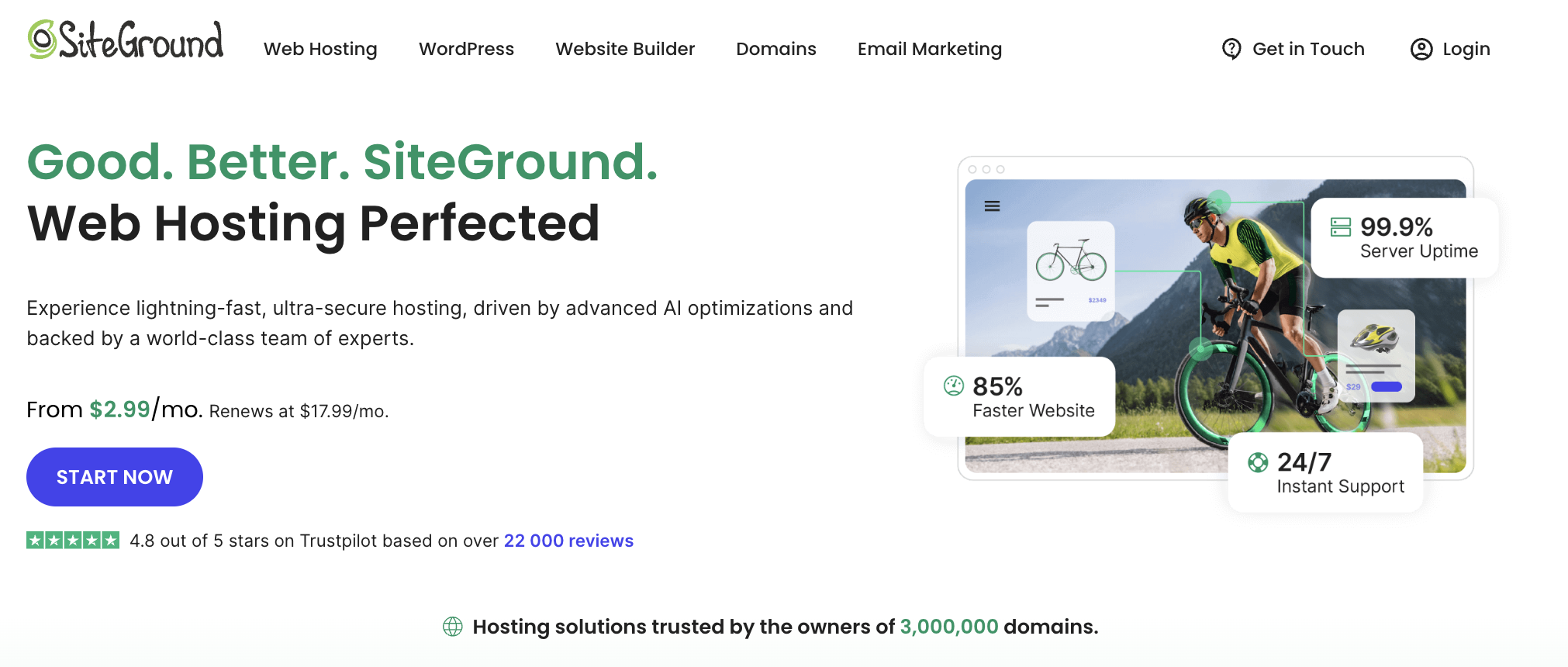
If you need a plan that supports more than one website or gives you more storage and monthly bandwidth for visitors, GrowBig is the better fit.
The big tradeoff with SiteGround is the renewal spike. Budget for it if you plan to stick around long-term.
But, in our eyes, that price can be worth it if you value consistent performance supported by superlative customer service.
If you’re willing to pay a bit more for that kind of peace of mind, get started with SiteGround today.
#6 – GreenGeeks — The Fastest Cheap Web Hosting

If you want raw speed at a low price, go with GreenGeeks. When we conducted our 30-day test, we were floored by how GreenGeeks blew away the competition in this regard.
And the truth is, they don’t boast about site speed like other providers. So, we’ll do the boasting for them.
Granted, we ran our tests on a pretty bare-bones website. But we did that for all of the providers we tested out. And GreenGeeks ran away with this category of testing, delivering an average load time of under half a second.
Outside of a few spikes that still barely exceeded one second, GreenGeeks loaded our site in the blink of an eye for just about the entire month.
This is twice as fast as some of the other hosts that we tested and top-tier performance for a shared hosting plan. You don’t even need to add any plugins or fiddle with any settings to unlock this speed.
Even on their worst day, GreenGeeks is faster than some other shared hosting providers’ best days.
They also give you a setup process that helps you get started on the right foot. You can choose which plugins you want pre-installed during onboarding, rather than having to manually delete the ones you don’t want.

GreenGeeks’ setup wizard streamlined the entire process of getting set up. The only thing we didn’t like was the lack of information on what to do after we installed WordPress.
You’ll have to pay a bit more than some other providers to unlock this level of speed on shared hosting. That’s to be expected.
Promotional pricing is right in the same ballpark as the other big names. Their single-site shared plan is very inexpensive on a one-year term, and the mid-tier plan adds unlimited sites and storage for only a bit more during the first term. All plans include a free year of a custom domain name, a free SSL certificate, nightly backups, and a 300% green energy match—plus they still plant a tree for every account.
It’s a great thing to promote if your company or organization is also eco-conscious.
Renewal pricing is higher (as with most hosts), so plan ahead for the standard rate after your first term.
All in all, GreenGeeks is the fastest host on this list. If you’re willing to pay a bit more after year one to keep your site loading in the blink of an eye (without leaving shared hosting), GreenGeeks will keep you satisfied.
#7 – Hosting.com — The Best for Sites Focused on Europe and Asia
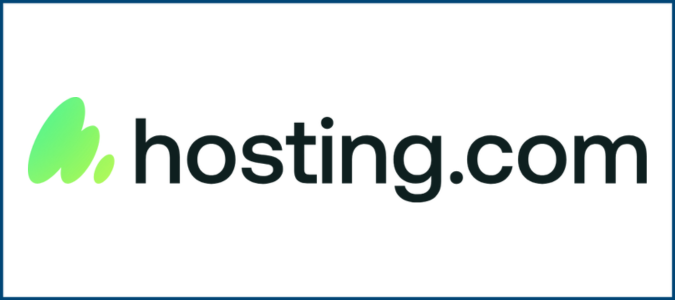
Hosting.com (formerly A2 Hosting) is the right choice for affordable shared hosting that can still perform well when your site gets visitors from all around the globe.
That’s because of their well-placed data centers. In addition to U.S. locations, Hosting.com now runs a broad global network (including Europe and Asia), so you can anchor your site as close to your audience as possible and keep time-to-first-byte low for overseas visitors.
They also have two separate data centers for the United States, one in Arizona and one in Michigan, which helps you also reduce the time to first byte if you have a larger visitor base on one coast of the U.S. over the other.
But it’s the global data centers that really appeal to us, because Hosting.com can be a bit pricey and less compelling if your audience is primarily domestic.

Introductory rates are competitive across single-site and multi-site plans, and you can also secure long-term promotional pricing on select tiers.
If you’re willing to spend a bit more, you can secure one of Hosting.com’s more unique offerings: their Turbo servers. These are designed to deliver much faster performance than traditional shared servers and they come with enhanced NVMe storage.
For those of you currently using another web hosting provider and considering the switch to Hosting.com because it’s cheaper, you’ll appreciate that Hosting.com offers free migrations.
Not only will this save you money, but it also ensures you get a smooth site transfer without having to worry about downtime or data loss.
In terms of total cost, note that not every plan includes a free domain. This isn’t a deal breaker for most situations since a domain is inexpensive, but if you’re on an ultra-tight budget it can factor into your decision.
There are some other flaws we didn’t care for. The onboarding and checkout experience can feel a bit overwhelming, with a crowded checkout and plenty of upsells to navigate.
Plus, Hosting.com charges extra if you want to use their page builder, which is something almost everyone else offers for free. You could alternatively use a standalone site builder for free, as well.
After you create your account, there’s little guidance. We received an email with a ton of different login credentials and that’s about it. You’re largely left to figure it out on your own.
Outside of these issues, we still rate Hosting.com quite highly. They make it easier to cater to international site visitors and unlock enhanced site speed without having to leave the more affordable world of shared hosting.
If you have a global audience or want to launch a site specifically for your visitors in Europe or Asia, get started today on Hosting.com.
Methodology for Choosing the Best Cheap Web Hosting
We determined which hosting providers made the cut for this list through a time-consuming research process. We took an entire month to collect all the data for our recommendations.
For every host that we evaluated, we went through this testing process:
- We opened a brand-new account with the web host
- Starting from scratch, we went through their entire onboarding process
- We set up a new website by installing WordPress, using the same theme and settings
- We monitored site speed and uptime for the month
- We went through three separate support interactions to see how helpful they were
After running all our tests, we determined which hosting providers offered the best value for certain use cases. Every provider above offers a cheap shared hosting plan or two—but what gives you the most bang for your buck for each one?
That’s why you’ll see every review above explain what you’ll end up paying for at least one shared hosting plan, then elaborate on what kind of site owner would get the most out of using that plan. For some folks, just getting the lowest rate is all that matters. For others, it’s about getting a good deal on a host that delivers specific benefits, like speed or ecommerce support.
Let’s go through the main factors we used to determine which web hosts to include on our list and where to rank them.
The Upfront Cost of Promotional Pricing
Getting a cheap web host is all about keeping your costs down.
Every provider that we reviewed has a plan with monthly promotional pricing under $7. At first glance, everyone’s pricing can look very similar.
In practice, though, the total you’ll spend for your first year of hosting can vary widely. The checkout total depends on the add-ons selected and the term length you choose.
The first thing to watch for is the cost of add-ons, like a domain name, domain privacy, and other features you may need that aren’t included in your hosting plan.
Our research discovered that many “cheap” plans don’t include some of these things, which means you’ll pay more than you’re expecting. Domain names are a big one here—just about every provider offers a free year of a domain, but usually only on select plans and terms. The really valuable cheap hosts extend this offer on most shared hosting plans when you choose an annual term or longer.
So, while something may seem to be the cheapest option out there, don’t forget to factor in these extra expenses when comparing prices for different providers.
The other thing to be on the lookout for is term length. That rock-bottom rate you see on every hosting provider’s pricing page isn’t for a true monthly bill. You’re going to need to commit to a year or longer at the outset to secure that rate.
And rates can change significantly based on the length of that commitment. Sometimes, a provider’s plan on a one-year term is priced at a lower monthly rate than a three-year term. In other cases, the inverse is true and you get the best deal overall by locking in three years at checkout.
The bottom line here is that you’re not going to get that super-low advertised rate by only paying for one month today. You’ll need to factor in how much cash you need to put down after signing up and what it’s going to cost you for the long haul.
That’s why renewal pricing is an entirely separate consideration.
Renewal Pricing and Long-Term Value
Let’s say you get a great promotional price. You’ve paid as little as possible for your first term. Time goes by, you forget about your hosting entirely, and one day you look at your credit card bill to see months of charges that are almost as much as you paid for the introductory term itself.
That happens all the time. And it is one of the most frustrating parts of running a website. Hosting providers will hike up your rates after your promotional period ends—there’s no way around that. All you can do is educate yourself on these renewal rates before you commit to a host in the first place.
Among the providers on our list, we’ve seen second-term increases ranging from modest to very steep.
The key here is to consider this alongside the way that your introductory term affects pricing. Longer initial commitments often give you slightly reduced renewal rates once they expire. So, you may end up paying a bit more per month to choose a three-year term over a one-year term at checkout, but you get to reap the benefits of a lower monthly rate after the term ends.
In this case, think about how long you’re planning to keep this site (or hosting plan) up and running. If it’s a short-term project for marketing or an event, you probably won’t gain any value by going for the longer term.
But, for any site that plans on sticking around for a while, you’ll want to prioritize long-term value by calculating what a hosting provider will cost you in year four and beyond.
Help for Web Hosting Beginners
A lot of people looking for cheap shared hosting don’t have a lot of demands in terms of resources and extra features. Really, they just want affordable hosting for their website from a provider that makes it easy for them to manage it and get help when it’s needed.
That’s where two big factors come into play: the ease of setting up your hosting and website and the convenience and helpfulness of a host’s channels for customer support.
Ideally, the onboarding and setup process should feel effortless.
When we set up our sites on a few of the providers we reviewed above, our experience was excellent. We were walked step-by-step through the process and felt confident along the way. And, most importantly, we felt any beginner could easily do the same.
We favored hosts that provide a guided process in a clean interface that’s easy to grasp, especially if they clearly marked your options for building a new site or migrating an existing one to your new host.

Others that we tested weren’t as neat and clean as this. Some densely pack information into your screen. Even if what’s shown on the page isn’t super technical, it could easily be overwhelming for someone who has never set up their own hosting before.

The whole process can be very confusing if you have no idea what’s going on.
In the reviews above, we make sure to call out both sides of this coin, highlighting the hosts kindest on beginners and flagging those that make this process more complicated than inexperienced users might like.
Then, there’s support. Even if the setup process is the easiest thing in the world, you’re likely to eventually run into something that requires you to seek direct assistance from your hosting provider. That might be unexpected downtime or errors or just questions you have about how to maximize performance or accomplish something.
Whether you’ve never set up a website before or have set up hundreds, quality 24/7/365 support is crucial.
At this point, most providers offer at least live chat support. Quality can vary here, both in terms of how long you’ll have to wait to connect to a rep and how helpful that rep will actually be.
When providers really shone in their level of service, we spotlighted that in their review above. Unfortunately, truly helpful customer support can be rare these days. So, when we encountered representatives that understood our questions and answered them in a timely, thoughtful manner, we were floored.
The same goes for any provider that offers phone-based support. This, too, is exceedingly rare these days. But it can make a world of difference for a user when they have a phone number to call instead of a live chat widget.
We based our assessment of customer support on reps’ answers to these three questions:
- What security features do you offer so I can make my site more secure?
- Can you walk me through setting up my email address at my domain?
- How can I make my site load as fast as possible?
These are common issues for a novice user to have. When we call out a provider for good support, it means they answered these questions in a way that surpassed our expectations. You can be confident you’ll also get quality answers to these and any other questions should you opt for that web host.
Ability to Scale
Getting a cheap web hosting plan shouldn’t restrict your room for growth. While the cheapest plans on the market are always going to be entry-level shared hosting, you should still take a look at what your web hosting provider can offer at different tiers.
There are two common paths to take as you eventually outgrow your cheap shared plan.
You can either upgrade to another shared plan that has more resources or upgrade to another type of hosting—most commonly cloud hosting or VPS hosting.
Migrating your site to another web host is a pain, and it’s something you definitely want to avoid unless it’s absolutely necessary. So take the extra few minutes now to ensure the host at the top of your list offers a variety of other hosting options to choose from as your site grows in the coming years.
This will ultimately save you more money in the long run and reduce the chances of downtime and data loss during a migration.
Best Cheap Web Hosting FAQ
Hostinger is the most reputable and reliable cheap web hosting service. With plans starting at $2.99 per month, it’s tough to find a cheaper web host that offers everything you need.
While there are cheaper plans on our list if you’re truly going for the bottom dollar, and even free web hosting solutions, none of them come close to balancing ease of use, scalability, and customer support as well as Bluehost.
You can upgrade your cheap web hosting plan at any time in the future. If your traffic scales and you need more resources, you can always upgrade to a higher-tier shared hosting plan or upgrade to a VPS hosting plan. Cloud web hosting is another popular option for sites that want to upgrade from a cheap hosting plan.
To make things easier in the future, it’s best to select a reputable cheap web hosting provider that offers a wide range of other hosting solutions. Then you can upgrade your cheap hosting plan when you’re ready, without having to switch providers.
GreenGeeks is the fastest and cheapest web hosting provider on the market. Of all the cheap web hosting providers that we tested, GreenGeeks had the fastest speeds and still offers cheap hosting rates.
Signing up for GreekGeeks gives you the best value between speed and price. The fast page loading times will give your site visitors an optimal experience, and faster speeds can help give you the edge in outranking your competitors in the search results.
The disadvantage of cheap web hosting is that you’ll be sharing server resources with other websites on the same server. This means that a traffic spike on one site can potentially slow down the loading times on your site—ultimately hindering the user experience.
Many cheap hosting plans also limit your storage, memory, and processing power. So you’ll eventually need to upgrade as your site gets larger and your traffic scales.
Hostinger is the best cheap shared hosting provider overall. It’s affordable, reliable, full-featured, and offers plenty of room to grow. Plus, it’s just about as easy as it gets.
We also recommend Bluehost and HostGator’s affordable cloud hosting services to round out our top three picks.
Summary
Finding a cheap web host that performs well enough for your needs can be hard. We hope our post takes some of the mystery and misery out of finding the best choice.
Our advice is always to sit down and take the time to list out your requirements. Then, make an educated decision based on your priorities and specific needs, particularly your budget.
Hostinger is our top recommendation for cheap web hosting. It’s reliable, scalable, easy to use, and comes with everything you need at a rock bottom price. But if it doesn’t check all your boxes, you can use this post as a guide while you go through the process of making your final decision.



